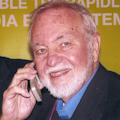Wireless Protocol Serves Up Multiple-Node Access
WirelessUSB radio modems crafted by Cypress Semiconductor hit the market over a year ago, replacing wires in various industrial and home applications. Now along comes the WirelessUSB N:1 protocol, which has opened up new doors for these modems.
Using a star topology, this protocol offers access to as many as 65,000 nodes. A central hub can then access data from remote sensors that monitor anything, from the state of a ceiling light to a hallway's temperature. It can also send commands to nodes to turn lights or whatever else off and on.
By using the WirelessUSB LR chips along with a microcontroller containing the protocol, data can be collected from as far away as 50 meters, depending on the environment. WirelessUSB LR chips, which employ the 2.4-GHz band, feature a 62.5-kbit/s data rate using direct-sequence spread-spectrum (DSSS) in one of 79 available 1-MHz channels. The devices stay asleep until data is about to be sent. These radios can run for many years on simple AAA batteries.
The big question is why designers should use Cypress' proprietary WirelessUSB protocol when ZigBee is already out there. Designed essentially for the same markets (namely industrial monitoring and control, home automation, and remote measuring), ZigBee and WirelessUSB differ in some significant ways.
For example, ZigBee can use a star or cluster topology, as well as a mesh arrangement, to establish ad hoc networks. This adds to the overall complexity of some projects. Mesh networks also consume more power when each node must stay awake to receive and retransmit data from any other node.
If only a wire needs to be replaced, WirelessUSB offers a simpler, less costly, and less power-hungry option. WirelessUSB also has a longer range and uses more channels than ZigBee. Thus, it more readily avoids interference in this already crowded space, which translates into greater transmission reliability. While Zig-Bee's 2.4-GHz data rate is faster at 250 kbits/s, most applications never use it.
Cypress also has released its WirelessUSB N:1 development kit, the CY3635. The kit and protocol cost $795.
Cypress Semiconductor Corp.www.cypress.comAbout the Author

Louis E. Frenzel
Click here to find more of Lou's articles on Electronic Design.